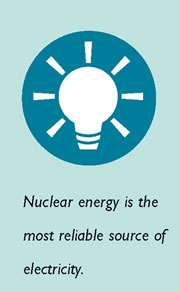Quid Pro Glow: UK Government Funds Nuclear Lobbying
 In Britain, "public money has been used to support a vigorous pro-nuclear campaign." The campaign, Nuklear21, includes "workers from the defunct Chapelcross nuclear plant in Dumfries and Galloway," who have been handing out leaflets at "Scottish party political conferences." The leaflets call nuclear power "atoms for peace" and claim that "nuclear will help save the planet." Nuklear21 has mailed every Member of Scottish Parliament and "is planning a mass lobby of the Westminster parliament." The government-owned company British Nuclear Group admits to paying "travel and business expenses" for Nuklear21 since 1995. It's also provided "'administrative support facilities' such as offices and communication systems." WWF Scotland's director called it "clearly outrageous" that "taxpayers' money has been secretly funding the nuclear industry to lobby for new reactors." Prime Minister Tony Blair launched a national energy review in January, which is splitting members of "the Liberal Democrat Party, the Labour Party and the government's green advisers."
In Britain, "public money has been used to support a vigorous pro-nuclear campaign." The campaign, Nuklear21, includes "workers from the defunct Chapelcross nuclear plant in Dumfries and Galloway," who have been handing out leaflets at "Scottish party political conferences." The leaflets call nuclear power "atoms for peace" and claim that "nuclear will help save the planet." Nuklear21 has mailed every Member of Scottish Parliament and "is planning a mass lobby of the Westminster parliament." The government-owned company British Nuclear Group admits to paying "travel and business expenses" for Nuklear21 since 1995. It's also provided "'administrative support facilities' such as offices and communication systems." WWF Scotland's director called it "clearly outrageous" that "taxpayers' money has been secretly funding the nuclear industry to lobby for new reactors." Prime Minister Tony Blair launched a national energy review in January, which is splitting members of "the Liberal Democrat Party, the Labour Party and the government's green advisers."
- 3085 reads
 Printer-friendly version
Printer-friendly version- Add new comment
- permalink





Comments
UK commission rejects nuclear 'solution'
Reuters reports that one of Britain's "leading government advisory group[s]" [http://www.planetark.com/dailynewsstory.cfm/newsid/35495/story.htm is strongly disagreeing] "with all those people advising the government that nuclear is necessary":